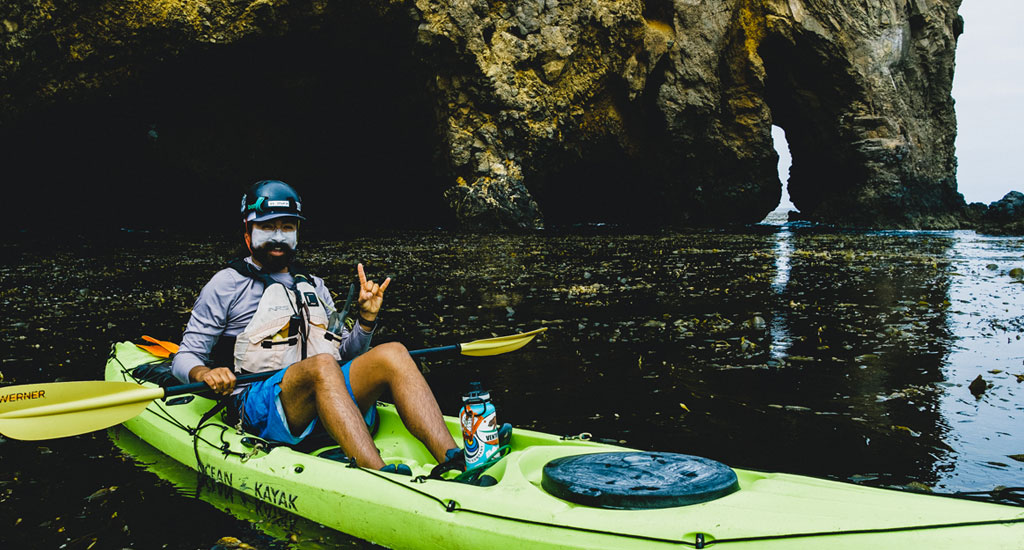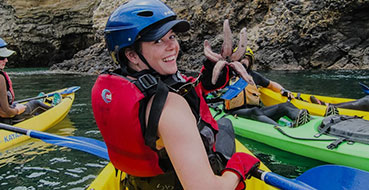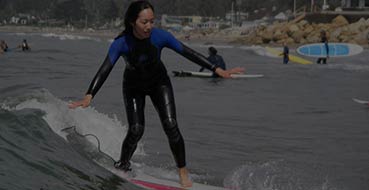Employment Opportunities / Outdoor Job Positions / Employment FAQ

Frequently Asked Questions
1. What is the hiring process like for the Santa Barbara Adventure Company?
Interested individuals should fill out our online job application on our website and send a resume and cover letter to hiring@sbadventureco.com.
We reach out to applicants and hire on a rolling basis, generally between January and May, with two main training sessions. We also conduct another round of hiring later in the year. Our interviews are group-style with 2-3 applicants and 1-2 interviewees. We require an athletic assessment which consists of running 1 mile and completing the physical duties of the job. For our first round of hires, training generally starts in February.
2. How do I become a Lead Guide?
For mainland trips, you are eligible to become a lead guide after assisting on at least 2 trips and then successfully leading a trip on your own under the supervision of another lead guide. You can expect to be considered for lead guiding at the Channel Islands after a few months to a full season of assistant guiding at the islands.
3. Should I live in Santa Barbara or Ventura?
Our guides live in both cities and in between. Most new guides can anticipate their training and preliminary months (February-April) to be in Santa Barbara for most shifts. From May-August, if selected to be a Channel Islands guide, you will spend 3-5 consecutive days on the island most weeks and you must travel to Ventura, CA to catch the ferry. As a newer guide, you will likely be staffed mostly on Santa Barbara mainland trips in order to gain experience with all of our different tours.
Our outdoor education and mainland trips all start from our warehouse at the corner of Anacapa and Haley Street in Santa Barbara. All Channel Islands trips (excluding Channel Islands outdoor education) start from the ferry terminal in Ventura, CA.
4. What does a typical workweek look like?
In one given week, you may kayak in the Santa Barbara Harbor, guide at Channel Islands National Park, cruise through wine country, and belay students on a high ropes course. Many of our staff enjoy the opportunity to hone multiple skill sets while working on a wide variety of trips.
5. How much do you pay? What should I anticipate tips to be?
We pay hourly. Hourly pay ranges from $16 – $19.75 based on prior experience and certifications (Wilderness First Responder, Class B Driver’s License, etc.). As you move from an Assistant Guide to a Lead Guide, your pay will increase.
In addition, our guests are encouraged to give 10-15% gratuity, and often tip with cash, Venmo, or credit card. For larger group sales/corporate trips, gratuity is often included and split amongst the guides. A majority of our group sales trips for corporate clients include an $8/client service fee to be split among staff.
6. Do I have to camp on the island? What do I need for staying on the island?
If you’re interested in becoming a kayak guide at Channel Islands National Park, you must be able to commit to camping 2-4 consecutive nights on the island per week. We provide fresh water shower facilities, a camp kitchen (Coleman multi-burner camp stove, Coleman oven, all kitchen utensils, etc.), and space to pitch a tent or hammock. We recommend bringing your own tent and sleeping set up for optimal comfort.
7. How does scheduling work?
Schedules are set as bookings come in. We try to schedule as far in advance as possible, but sometimes it can be short notice. Guides are expected to keep their availability up-to-date. We use the Paycor app, in which you can log in to view your and the team’s schedule in order to see who is on your trip (great for carpooling!) We recommend checking your schedule often to make sure you know what your week looks like — things will change. Guides can be scheduled for a standby shift up to 24 hours before a trip date. We will never schedule you for a tour within 24 hours without contacting you and getting confirmation of your availability.
The overall schedule varies based on the time of year, but generally, all new hires support Outdoor Education in February, March, and April with school groups. During these months, you can expect to be on 2- to 5-day overnight trips in Santa Barbara, on the Gaviota coast, Ojai, Channel Islands, or Big Bear area. When not supporting an outdoor education trip, you can expect to be an assistant guide on mainland and island tours, wine tours, and various team-building events for groups.
8. How does time off during the summer work?
Very little time off is given in the summer months, but we do try to accommodate when possible. When hired you should be prepared to give any time off you’d need from March-October as requests are typically honored on a first-come, first-serve basis.
9. What happens during the “off-season” from November-March?
As a new hire, you can anticipate consistent work from February through mid-October. We operate year-round, but things do slow down in the off-season. We start inquiring in August as to everyone’s plans and work to provide hours for those interested. The winter months see a higher ratio of wine tour shifts available for guides, which is why some guides choose to get their commercial driver’s license to operate wine tours—having this license also increases your pay.
10. Does Santa Barbara Adventure Company offer health insurance?
Health insurance is not currently offered for our guides.
11. What if I have life circumstances that don’t allow me to do overnight trips (a pet, caregiver, etc.) or I can’t do multi-day trips due to a conflicting work schedule at another place of employment?
We believe that our new hires are able to learn and grow the most from experience on multi-day trips. If you have a conflict with the multi-day trip schedule, this is something we would need to know in the hiring process.
12. Is there room for upward mobility within the company?
Definitely! We love to promote guides within our own staff to management-level positions before hiring from outside. For example, our General Manager, Group Sales Manager, Island Manager, Assistant Island Managers, and Environmental Coordinator were all guides prior to becoming managers within our company.
13. What certifications are required? What certifications can be helpful to have?
All guides must have basic CPR & First Aid certifications. You’ll receive a pay increase for having a Wilderness First Responder certification (WFR) and/or for having a commercial Class B driver’s license. We help support in getting ACA kayak certifications as well as Leave No Trace education certifications for guides.
14. What perks does this job offer?
We try to keep our staff happy and do as much as we can to keep them around so we’ve added some incentives over the years. Guides have access to heavily discounted tours for friends and family. We offer paid training in a variety of categories, not just the hard skills like kayaking, surfing, and ropes courses; but also official training through Leave No Trace and the National Association for Interpretation. Our company can also connect you with pro deals for industry discounts on gear and apparel.

